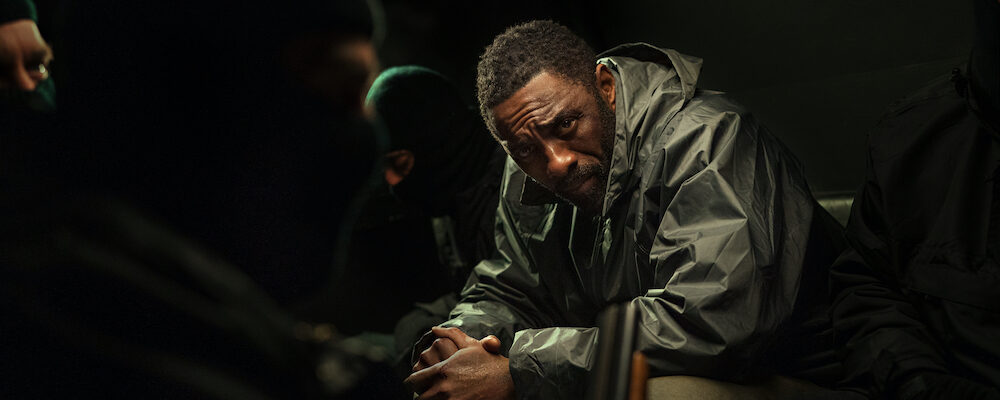‘Luther: The Fallen Sun’ Puts Idris Elba in a Bigger, Tougher Vision of the Gritty Series
Alci Rengifo
In a time before Peak TV, many hit series coveted the pathway to becoming movies. It was a sign of true prestige if your show could translate well to the big screen. Many tried and failed. Streaming is changing the game. Because so much TV is now of cinematic quality, a smart approach can help with a seamless transition that could simply mean a longer running time. Netflix’s “Luther: The Fallen Sun” is an effective, atmospheric thriller that gives us a movie follow-up to what was already an engaging, atmospheric BBC serial. It helps if you’ve seen the previous five seasons but you can very much enjoy it on its own. As with the show, its best quality is Idris Elba, so full of haunted pathos. He can make the most unbelievable parts of the plot feel more urgent than true crime.
Creator and writer Neil Cross makes sure to rewind just slightly to the last season finale. But before that, he initiates a new plot when a young officer janitor is lured to a rainy street on the outskirts of London and gets kidnapped. Last time we saw Detective Chief Inspector John Luther (Elba), he had been arrested for going outside the law one too many times. Here, we learn that it was the doing of a maniacal billionaire, David Robey (Andy Serkis), who wanted the DCI’s inquiry into the missing janitor thwarted. Languishing in a prison where every inmate wants a crack at him, Luther is determined to get out and nab whoever is behind a further series of kidnappings, one swathe resulting in fiery murders. He also needs to get through obstacles presented by new DCI Odette Raine (Cynthia Erivo), who has brought in Luther’s old superior, Martin Schenk (Dermot Crowley), to entrap him.
“The Fallen Sun” manages to find that essential spot for most TV-based films where newcomers won’t be lost while fans can enjoy the plot with its nuances. It helps that the overall storyline of “Luther” never became entangled in some overly archaic mythology that hobbles the plot, as has happened with even good TV-to-film titles. Like Netflix’s “El Camino: A Breaking Bad Movie,” enough exposition is given while the visual palette is made larger. “Luther” plays well as a film because it has much in common with grittier graphic novels that aim for spectacular, yet grounded storytelling. Director and series veteran Jamie Payne with cinematographer Larry Smith turns London into a shadowy otherworld full of Batman-worthy menace. And like Batman, Luther can single-handedly take on rioting prisoners, survive knifings and gunshots and intimidate some loser into talking. Idris Elba has famously been a name dropped over and over for James Bond, and while he would have been a great fit, he’s perfect as a fierce detective in a coat facing a society’s hidden terrors.
Evil and darkness are key themes to “Luther” and “The Fallen Sun” dives right into them with an appropriately paranoid, horrifying scheme by the villain. Robey is one of those classic madmen who channels his funds into creating vast networks of acolytes who watch over your emails and video chats, in order to gather incriminating evidence for potential targets. Serkis cackles and snarls with sickened pleasure. One of his best scenes has him singing “I’m Coming Out” to a burn victim while detailing his plans. He also has a knack for toying with Luther in overcomplicated ways the movie makes visually unnerving, such as sending torture audio through a radio frequency Luther has to tune into while imprisoned. His overall plan involves one of those internet twists out of a Blumhouse movie, yet made very believable in a gothic thriller manner by Cross and Payne.
There is a layered pacing to “The Fallen Sun” that also shames most American thrillers. It isn’t in a hurry to move on to action scenes, despite some good chases and fist-fights. It prefers to envelop us in neon-lit buildings where Luther badgers a suspect to talk and reveal something perverse. Payne likes to hold the camera and let us see Luther think as he puts the pieces together. It could be said it helps that after five seasons the characters have been through a lot and arrive at this movie with baggage that gives them extra depth. But that still says more than lazy thrillers that don’t bother to layer their characters with anything other than the mechanisms of the plot. Elements that are more than familiar, like Odette refusing to give Luther an easy pass or the inevitable mole at the office linked to the villain, function better because the movie strives for more than rehashing.
“Luther: The Fallen Sun” points the way to more movies featuring this character, something Elba has been very vocal about wanting to do. It joins a few films like “The X-Files: Fight the Future” where visual elegance and good writing appeal enough where you can go along with it, then go back and watch the show itself to take in the rest. The movie ends on an episodic note, hinting there’s more to tell. On Netflix it works perfectly. But more than the big twists, what lingers is Elba wandering through frozen landscapes, regretting past decisions and still pulling himself up to go stop evil. Maybe we don’t always need entire seasons to tell this kind of story, just good craft.
“Luther: The Fallen Sun” begins streaming March 10 on Netflix.

